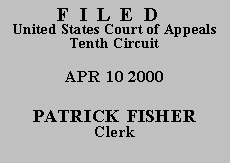

| EDWARD CHARLES LASTER,
vs.
GLYNN BOOHER |
|
After the passage of AEDPA, habeas petitions must be filed within one year from the date of final conviction. See 28 U.S.C. § 2244(d). However, when a conviction becomes final prior to April 24, 1996, the effective date of AEDPA, a petitioner has a one year grace period until April 23, 1997 to file his habeas petition. See United States v. Simmonds, 111 F.3d 737, 745 (10th Cir. 1997). Mr. Laster's conviction became final on November 11, 1996, ten days after sentencing, when Mr. Laster's time for withdrawing his plea expired, see Rules of the Oklahoma Court of Criminal Appeals, Rule 4.2(A), and he is subject to the April 23, 1997 filing deadline. Although a properly filed state post-conviction application can toll the time limitation during the one year grace period, Mr. Laster did not have any applications pending between April 24, 1996 and April 23, 1997. Therefore, he is time barred under AEDPA from pursuing his first seven claims.
Mr. Laster argues, however, that he only recently discovered new evidence regarding his claims which would toll the time limitation until the date on which the information was discovered. See Aplt. Br. at 26; see also 28 U.S.C. § 2244(d)(1)(D) (running the one year limitation period from "the date on which the factual predicate of the claim . . . presented could have been discovered through the exercise of due diligence."). The evidence he relies upon is an August 1998 document entitled "Narrative Response" which was filed by his trial attorney in response to an Oklahoma bar complaint filed by Mr. Laster. Aplt. App. at 104. The document describes the chronology of the plea agreement and, in relevant part, states that (1) part of the plea agreement was to dismiss the state RICO charge and (2) Mr. Laster was told that he would be eligible for parole in four years, when he was actually not eligible for twelve and a half years. Id. at 106.
However, neither of these two items was new evidence to Mr. Laster when the Narrative Response was written in 1998. First, any discrepancy between the plea agreement and the sentence was clearly discernable at the time of sentencing in 1991. See Gable v. Maxwell, No. 99-5061, 1999 WL 454366, at **2 (10th Cir. July 6, 1999) (unpublished). Second, Mr. Laster had been informed by a March 1992 letter that the advice regarding parole had been mistaken. See Aplt. App. at 75. Therefore, because the information in the Narrative Response was not new evidence, Mr. Laster's claims do not fall within the tolling provision of § 2244(d)(1)(D) and he is time barred.
Mr. Laster's final claim, which the district court denied on its merits, relates to earned credits in the Oklahoma Department of Corrections (ODOC). In Oklahoma, earned credits are available to inmates and serve to reduce the final term of imprisonment. Okla. Stat. tit. 57, § 138 (West Supp. 2000). Under Okla. Stat. tit. 22, § 1404 (West Supp. 2000), however, an inmate convicted of a state RICO violation, 22 § 1403, is not "eligible for a deferred sentence, probation, suspension, work furlough, or release from confinement on any other basis until the person has served one half (½) of his or her sentence." Mr. Laster contends that the denial of earned credits on his state RICO charge is a violation of equal protection. However, earned credits are only available "[e]xcept as otherwise provided by law." Okla. Stat. tit. 57, § 138(A). Therefore, under the specific terms of Oklahoma law, it is clear that Mr. Laster has no liberty interest in earned credits for a violation of the state RICO statute. Without such an interest, there is no violation of equal protection. Moreover, inmates who have served less than one half of their sentences are not a suspect class, and the challenged provision need only bear a rational relationship to a legitimate state interest. In the instant case, the state provision is rationally related to legitimate penological concerns. See Shifrin v. Fields, 39 F.3d 1112, 1114 (10th Cir. 1994).
We DENY a certificate of appealability and DISMISS the appeal.
Entered for the Court
Paul J. Kelly, Jr.
Circuit Judge
*. This order and judgment is not binding precedent, except under the doctrines of law of the case, res judicata, and collateral estoppel. This court generally disfavors the citation of orders and judgments; nevertheless, an order and judgment may be cited under the terms and conditions of 10th Cir. R. 36.3.
**. After examining the briefs and the appellate record, this three-judge panel has determined unanimously that oral argument would not be of material assistance in the determination of this appeal. See Fed. R. App. P. 34(a); 10th Cir. R. 34.1 (G). The cause is therefore ordered submitted without oral argument.